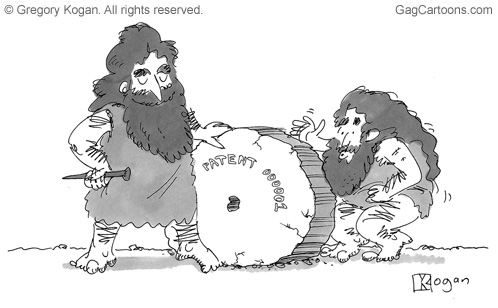Blog Archives
Planet Open Source: Will 3D Printers Bring an End to the World Economy?
Man is born free, and everywhere he is in chains. ~Jean-Jacques Rousseau (The Social Contract)
* * *
From the first day to this, sheer greed was the driving spirit of civilization. ~Friedrich Engels
* * *
Look, a guy who builds a nice chair doesn’t owe money to everyone who ever has built a chair, okay? ~Mark Zuckerberg (played by Jesse Eisenberg) in The Social Network (2010)
* * *
You see, money doesn’t exist in the twenty-fourth century. The acquisition of wealth is no longer the driving force in our lives. We work to better ourselves and the rest of humanity. ~Capt. Jean-Luc Picard, explaining to a twenty-first-century woman how the “economics of the future” differ from hers
_________
It’s often been said that humans are the only species who pay to live on Earth. Before we emerge from our mothers’ wombs — indeed, even while we patiently gestate inside our mothers’ uteri — we have already assured our parents an often insurmountable heap of expenses and debt for which they are responsible: food and clothes and toys and books and medical attention and hobbies and extracurricular activities and cars and higher education. By the time she turns 17, a child born in 2011 will have cost an average middle-class family $234,900. For no other reason than she came flailing and screaming into the world.
Will our penchant for commodifying every last scrap of our existence still remain strong in the year 2099? For how many more decades will humanity tolerate being enslaved by an imaginary, man-made monetary system that favors the very few, just as feudalism did centuries ago?
European feudalism, of course, lasted only 700 or 800 years before gradually giving way to what we now call capitalism — a term popularized by socialist Karl Marx, of all people. And like feudalism, modern capitalism has its roots in human bondage. Its success as the prevailing social system in the Western world would have been very difficult indeed had it not been for the lucrative human trafficking business. In fact, large American banking corporations such as the Warren Buffet-run Berkshire Hathaway, the now-defunct Lehman Brothers, JPMorgan Chase and Wachovia all came to prominence as a result of their involvement, one way or another, in the African slave trade.
Nearly 150 years after the abolishment of slavery, the business model of commodifying human life still persists. We often talk about how much this celebrity or that politician is worth, as if monetary wealth is a person’s ultimate defining characteristic. We put a price on basic human needs such as food, shelter and health care — a price that’s too frequently beyond the means of many families. Around the world, human trafficking remains a thriving industry. We’ve even gone so far as to grant legal personhood to corporations.
Under the capitalistic model, people are commodities, and commodities are people.

Neanderthals…
But like feudalism, capitalism will one day buckle under the weight of its many inherent shortcomings. A system that sets arbitrary value on goods, services and people is doomed to fail.
The question is: What will take its place? If capital and the drive to acquire wealth no longer exist in Capt. Picard’s twenty-fourth century, how are goods and services exchanged? What motivates people to go to work and be productive members of society when imaginary Monopoly money is no longer the reward?
As always, the Future Culturalist is mum on details regarding the nature of the economy in the year 2099.
_________
Linux and Wikipedia
For solutions on how to move past a capitalistic social system, we might look at the thriving world of open source software. Millions upon millions of people solely use the free operating system Linux as an alternative to the pricey and, many would argue, inferior Microsoft Windows. People don’t necessarily use Linux because it’s free; they use it because the source code is open to the public, allowing for greater creativity, innovation and collaboration than you can find on the corporate-owned Windows.
Another good example is Wikipedia, the free online encyclopedia. There are over 4,100,000 articles in the English-language version alone, all of them maintained and contributed to by “ordinary” users. In the past, Wikipedia has been criticized for allowing baseless or false information to appear on its site, but vigilant contributors tend to correct the work of Wikipedia “vandals” pretty quickly.

The University of Kentucky: you’ll never find a more wretched hive of scum and villainy.
That collaborators will never receive any monetary compensation or royalties doesn’t stop them from modifying and improving Linux and Wikipedia. They work, as Capt. Picard says, to better themselves as well as humanity. It’s the take-a-penny-leave-a-penny model of innovation that attracts such people.
Some work to improve open source software. Some simply use it. Those who try to abuse it — and many do — are outed and ultimately disbarred from participating. Everyone benefits.
Andre Charland, an Internet software developer, had this to say after open-sourcing one of his company’s products: “You can’t do it soon enough. You’ll be blown away by how much better your code gets and how much more quickly you can reach a broader audience.”
Case in point: those who use Linux know how much more efficiently it runs than Windows. And because of the success of Wikipedia, when did you last use a paper-bound encyclopedia?

Should be “Wikipedia Brown’ now.
How then can we emulate this model in our general social system? What would an open source economy look like? How would it function?
_________
3D Printing
In Star Trek, people of the future routinely enjoy the convenience of replicators, which are machines that can synthesize pretty much anything you want them to by rearranging subatomic particles into food, water, clothes, toys, spare parts and much more.
How about paper money? A pile of gold Krugerrands? A $1 billion check issued by the IRS?
This is forgery, of course, but no doubt anyone with a replicator would use it as his or her own ATM machine. After all, entertainment and software companies have tried cracking down on pirating and illegal file-sharing, but they still lose billions annually, with the amount likely to rise. The problem will only increase with the availability of 3D printers, which are simply precursors to replicators.

Will this…

…eventually become this?
It’s apparent that, were everyday folk permitted to own powerful Star Trek-caliber replicators, it would spell the end of the economy as we know it — or at least of physical currency of any kind. Perhaps this is why the acquisition of wealth is no longer important in Picard’s time. With wealth available to all as plentifully as oxygen, it loses its uniqueness and desirability (and “wealth” here means anything of value, not just currency). Consequently, there would be no reason to work in exchange for wealth.
Think of all the companies and businesses that would instantaneously be rendered obsolete. If you scroll through the Fortune 500 for 2012 — a list of the U.S.’s most profitable companies — you’ll find it populated by corporations whose goods and services many of us can’t easily do without: oil, food, banking, communications, automobiles, retailing. In the top ten alone, we find four oil companies, two automakers, a tech firm, a massive holding company, a mortgage lender and the world’s largest retailer. The #1 company, ExxonMobil, is worth close to half a trillion. The combined revenue of these ten companies amounts to over $2 trillion — greater than the GDP of many small countries and about an eighth of the U.S.’s debt.
What role would these corporations serve in a world in which replicators were as ubiquitous as cell phones?
Because they hold patents on their intellectual property, they would undoubtedly charge you a service fee for replicating them. Interested in putting genuine Exxon fuel in your car (assuming we still use internal combustion engines)? Service fee. Hungry for a McDonald’s Big Mac? Swipe your card here. Got your eye on the latest Apple iDevice? Pay up.
Already, 3D printers are raising sticky copyright issues. But as more and more people own 3D scanners and printers, the problem will become too great for corporations to manage, as we are currently seeing in the entertainment industry. Even if the devices come with preventive measures, hacking will become widespread.
It’s perfectly conceivable, in fact, that once 3D printers are as powerful as the replicators featured in Star Trek, intellectual property will no longer be relevant. Everything will be open source, readily available and, indeed, modifiable to anyone with access to such technology. Because if acquiring wealth is no longer important, what would motivate an individual or corporation to legally protect intellectual property?
_________
Planet Open Source
The most fervent capitalists will inevitably balk at the idea of an entirely open source world. This is just techno-socialism, they might say. If no one owns his or her ideas, competition would cease and innovation would die. Plus, if no one works to acquire wealth and make a living, idleness and crime will prevail. While these are valid arguments, there are a couple of strong counterarguments.
For the majority of human history, we’ve done without copyrighting, trademarking, patenting and other ways of protecting intellectual property. And yet somehow we mustered the drive and curiosity and ingenuity that’s required to make great strides in every area of human knowledge: science, art, literature, music, metallurgy, woodworking, astronomy, agriculture, fashion. Good thing, too: imagine if Gurg had been allowed to take out a patent on his invention, the wheel. It’s absurd to think about.

Secondly, the availability of replicators would not lead to idleness and crime. In fact, it would have the exact opposite effect on society. Crimes of passion such as rape and murder might still exist, but with everyone’s basic needs met and poverty and desperation eliminated, there would be little reason to steal. You could make the case that crimes would still be committed by those with mental disorders, but replicators would give the afflicted free access to the best medications, so long as they were responsible enough to take them regularly or had the help of a family member or social worker.
And as for idleness: free of the stress and inconvenience of having to work for a business or company that means little to you other than a way to pay the bills, people might then have the time and energy to pursue other goals in life. They could “work to better [themselves] and the rest of humanity,” instead of a corporation’s bottom line. Rather than greed and cutthroat competition, the driving forces in society would be self-improvement and collaboration.
Like all the futuristic technology featured in Star Trek — or any sci-fi, for that matter — replicators seem too distant a notion to ever become a reality. But a reality it will one day become: we are already witnessing its inception with the 3D printer. Coupled with the power of open sourcing, universal replication will help usher in a new kind of economy, one that doesn’t favor the few and necessitate the arbitrary commodification of goods, services and human life.
